Simon Grove-White – Previewing the CCIN Social Value Toolkit: establishing a new ‘commons sense’ in procurement and commissioning
- April 2025
We use cookies to help you navigate efficiently and perform certain functions. You will find detailed information about all cookies under each consent category below.
The cookies that are categorized as "Necessary" are stored on your browser as they are essential for enabling the basic functionalities of the site. ...
Necessary cookies are required to enable the basic features of this site, such as providing secure log-in or adjusting your consent preferences. These cookies do not store any personally identifiable data.
Functional cookies help perform certain functionalities like sharing the content of the website on social media platforms, collecting feedback, and other third-party features.
Analytical cookies are used to understand how visitors interact with the website. These cookies help provide information on metrics such as the number of visitors, bounce rate, traffic source, etc.
Performance cookies are used to understand and analyze the key performance indexes of the website which helps in delivering a better user experience for the visitors.
Advertisement cookies are used to provide visitors with customized advertisements based on the pages you visited previously and to analyze the effectiveness of the ad campaigns.
In Kirklees we’ve been working hard to establish an inclusive economy since 2018. This requires a multi-pronged approach using every lever and opportunity we have available to us as a local authority and working with our partners across the public, private and community sectors. Working in this way is essential to transforming our economy and avoiding long-term recurrence of what we’ve seen in the winter of 2022/23 as a result of the cost of living crisis.
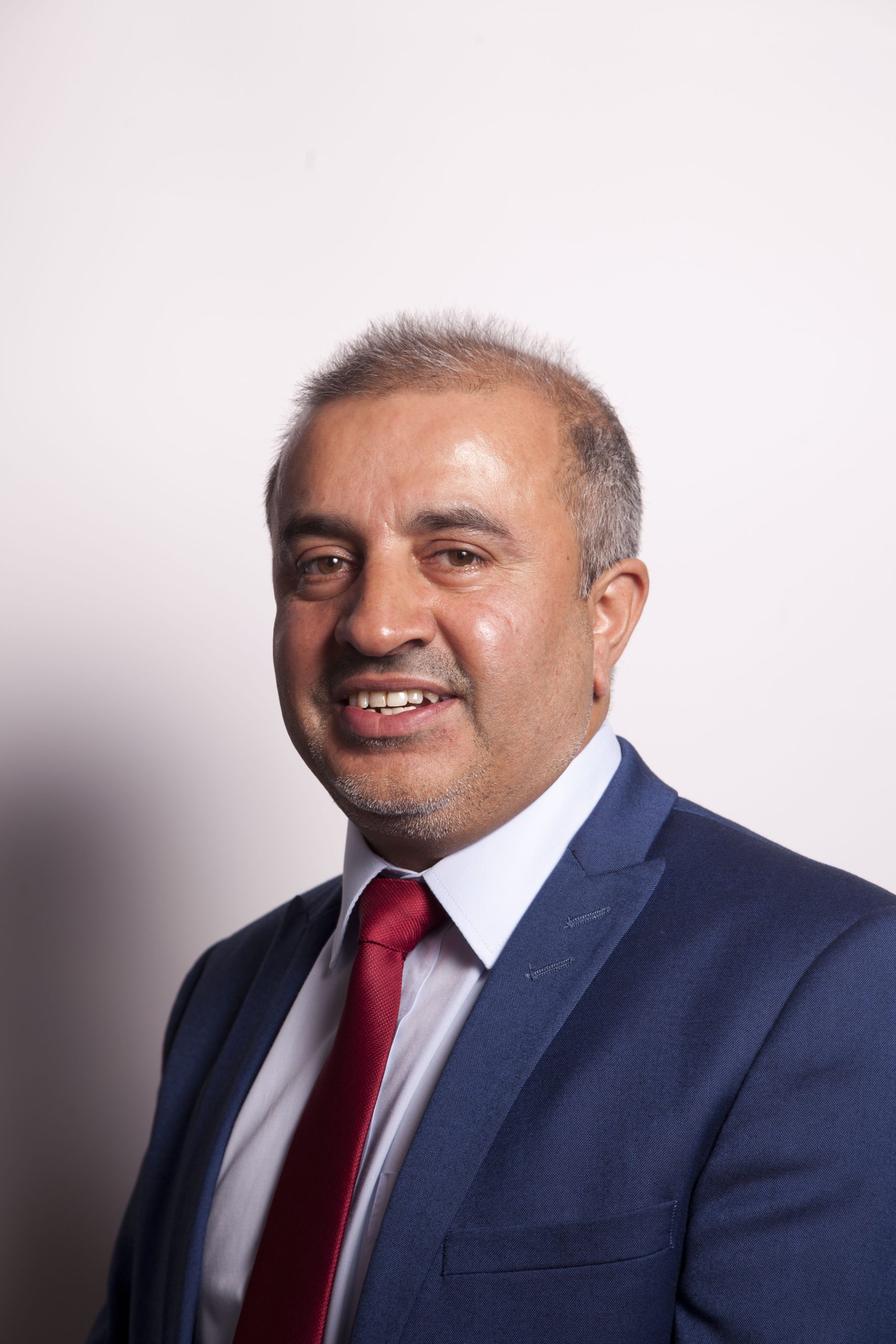
Leader of Kirklees Council and member of CCIN Executive Oversight Committee
Kirklees is a vibrant district at the heart of the north. With a population of over 433,000 people, Kirklees stands as the 12th most populous local authority area in England. Its diverse communities, vibrant town centres, and rich local history make it an exceptional place to live, work, and study. However, amidst its many strengths, Kirklees faces economic challenges, including a significant poverty rate.
In this article, we will delve into the eight key areas that define Kirklees’ inclusive economy approach and explore the progress being made in each domain. The diagram below illustrates our inclusive economy framework.
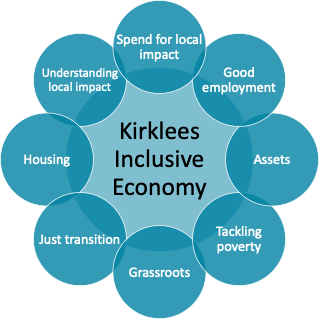
Kirklees possesses great potential to drive local economic benefits through its substantial budget. With a direct budget of £370 million and influence over almost £1 billion of spend, Kirklees has recently adopted a new Procurement Strategy that places social value and inclusive procurement at its core. Going beyond procurement, the district has implemented a comprehensive Social Value Policy that considers commissioning, employment, assets, grant giving, development planning and other areas. Major projects like the £210 million Huddersfield Cultural Heart town centre redevelopment exemplify Kirklees’ commitment to social value, as these investments aim to transform the job market for residents and bring new uses to the town centre. Social value is a significant part of the procurement process and we’ve worked hard to set out our expectations for suppliers and not simply accept what the market offers.
We’re on a journey but are very proud to have recently won the National GO Awards Social Value Local Government Award recognising the progress we’ve made.
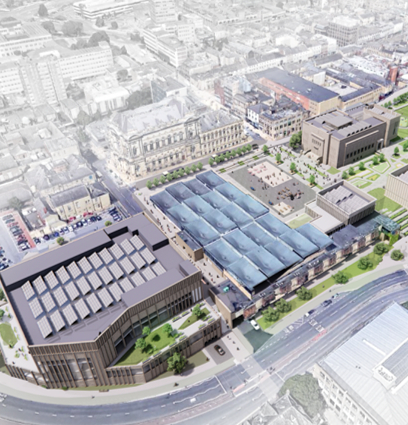
Creating good local employment opportunities is crucial to building an inclusive economy. Kirklees has taken proactive measures to become an inclusive employer and a preferred choice for its residents. Initiatives such as name-blind recruitment and guaranteed interview schemes for care leavers, veterans, and individuals with disabilities have been implemented. The Project Search program, in partnership with Mid Yorkshire NHS Trust, has successfully supported young interns with learning disabilities and autism in securing permanent employment within the district. Kirklees has also worked with the Institute of Civil Engineering to launch virtual work experiences targeted at schools in areas of high deprivation, facilitated the government’s Kickstart program as an intermediary, and established the Kirklees Apprenticeships for All program. Additionally, the council has actively participated in the development of the West Yorkshire Mayor’s Fair Work Charter and we’re excited to see this launched soon.
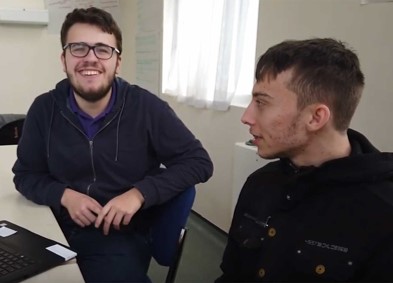
Recognising the significance of community assets in community empowerment, Kirklees has transferred 23 assets, including community centres, libraries, civic halls, and green spaces, to protect them from austerity measures. These transfers have ensured that these valuable resources remain accessible to the community. Having learnt lessons from our early experiences we’ve increased the support given to groups as they prepare to take on assets and afterwards. Furthermore, Kirklees has worked effectively with the University of Huddersfield to utilize assets in Huddersfield town centre to support the Temporary Contemporary initiative, providing spaces for local creatives to perform and exhibit their work through partnerships with the University of Huddersfield and others.
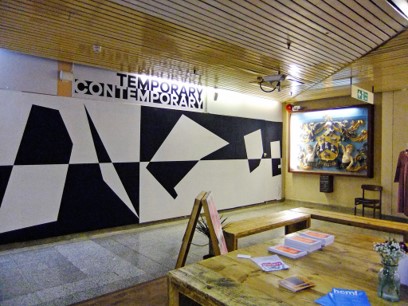
Addressing poverty has always been a fundamental aspect of Kirklees’ inclusive economy approach. The district formed a Tackling Poverty Partnership before the onset of the COVID-19 pandemic, which led to the development of a food aid network. In response to the pandemic, Kirklees swiftly brought together food banks and smaller food aid groups to share resources and best practices, ensuring that vulnerable individuals and families received the necessary support. Additionally, various initiatives have been implemented to provide access to essential items such as white goods, furniture, and school uniforms.
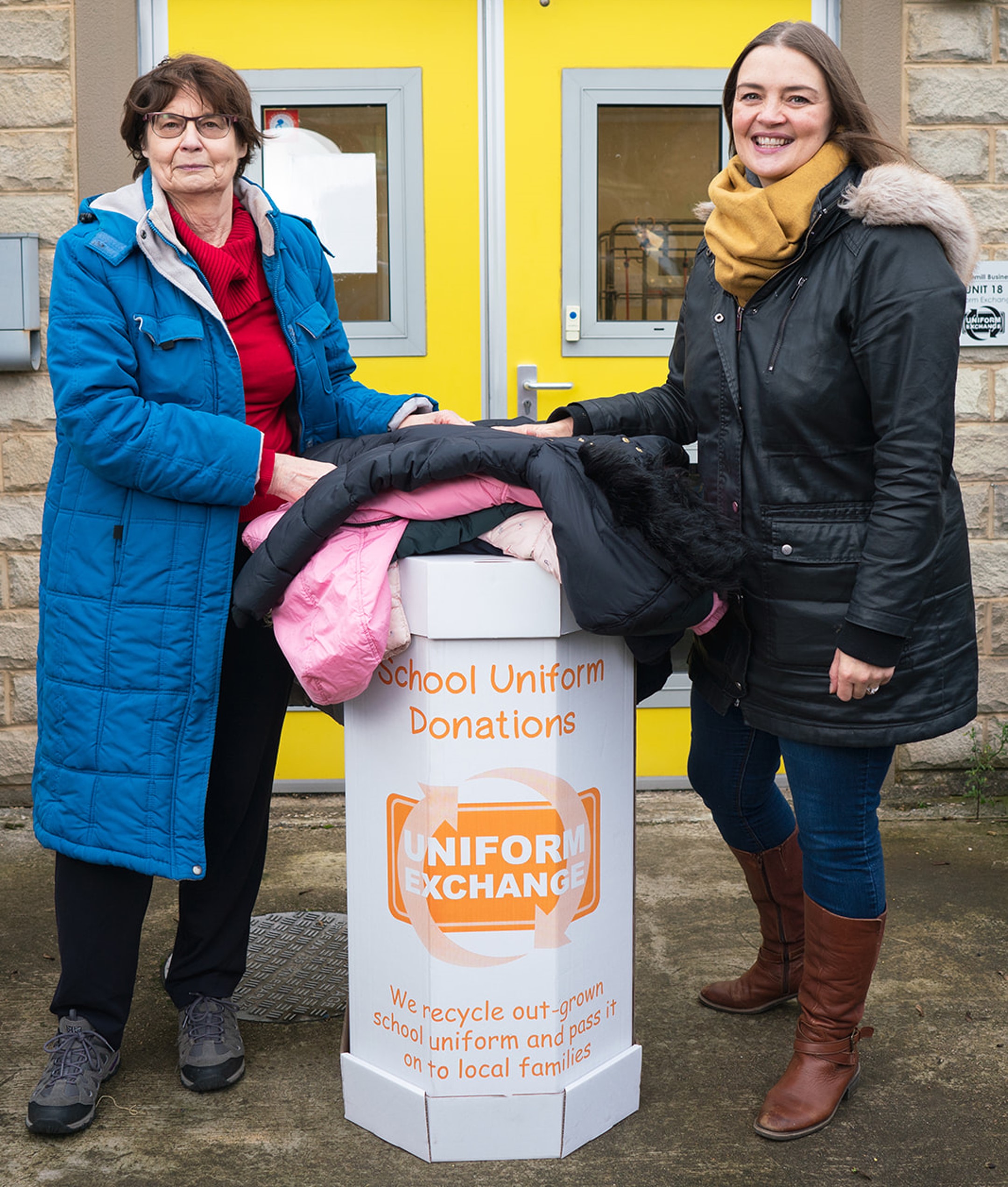
Ensuring the sustainability of the Voluntary, Community, and Social Enterprise (VCSE) sector is essential for Kirklees’ future. In collaboration with the sector, the Council has co-developed the Kirklees VCSE Investment Strategy, which emphasises investing to build trust and transparency, investing in the best-placed service providers, and increasing VCSE capacity, resilience, and sustainability. The district is also committed to supporting the development of cooperatives and social enterprises, exemplified by initiatives like the Kirklees Social Enterprise Competition and the support the Council provided to establishing Cooperative Care Colne Valley, now a member of the CCIN. We are continuing to support The Arcade – Dewsbury to take on management of the Dewsbury Arcade once its restoration is complete – what would be Europe’s first community run shopping centre.
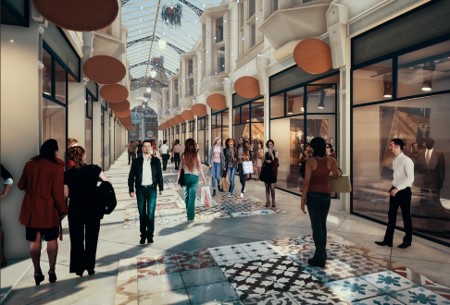
As part of our commitment to combat climate change, we aims to achieve net zero emissions as a council by 2030 and as a district by 2038. This transition to a sustainable future is approached with a focus on avoiding negative impacts on disadvantaged communities. We have collaborated with Leeds University to promote circular economy approaches that not only benefit the environment but also create entry-level jobs. The Abbey Road retrofit program is transforming council housing into highly energy-efficient homes while simultaneously developing local skills. The district also supports cycling accessibility through partnerships with social enterprise StreetBikes, which provides repair workshops and pop-up shops for affordable bicycles.
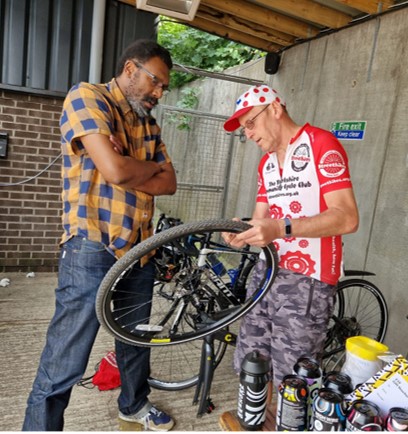
In all housing growth projects, we prioritise maximising the number of affordable homes and ensuring their sustainability, making them affordable, comfortable places to live. Collaborating with Keepmoat Homes, the district is developing 319 homes in Soothill, Batley, including 65 affordable homes and 15 plots for the first homes scheme. Additionally, Kirklees is pioneering a Passivhaus pilot project featuring 100 energy-efficient social housing units. Furthermore, the district is constructing ten 2-bed bungalows in Fernside using off-site construction, targeting older individuals who are under-occupying family homes.
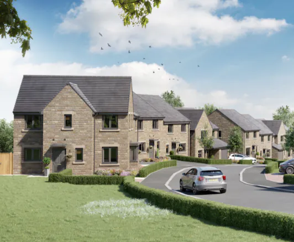
The opinions and perspectives of Kirklees residents are integral to driving progress. The district has engaged with over 10,000 individuals through 27 Place Standard engagement exercises to gain insights into their views on their communities. The Currently Living in Kirklees (CLiK) survey was conducted in partnership with local anchor organisations, complementing national statistics and providing valuable local insights. The Community Champions program, facilitated by VCS Community Anchors, ensures direct engagement with local residents on important issues, ranging from dispelling myths about the COVID-19 vaccine to addressing digital exclusion.
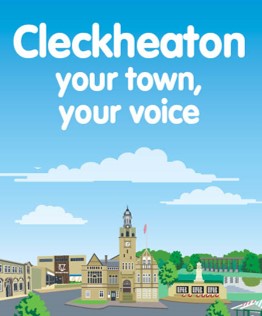
We’ve made it through the intense winter months of the cost-of-living crisis but we know that short-term responses alone are insufficient and we must work as a cooperative council with our local partners and work with our fellow cooperative councils to share approaches and drive national change. Kirklees will continue to advance its inclusive economy agenda, proud of its accomplishments and eager to achieve more. The ultimate measure of success will be witnessing the residents of Kirklees reach their full potential. Together, we can build an inclusive economy where no one is left behind.